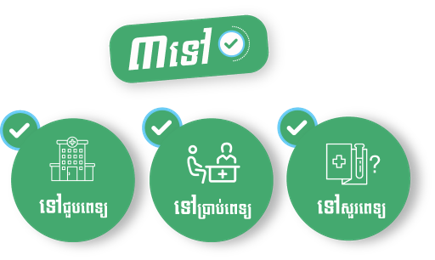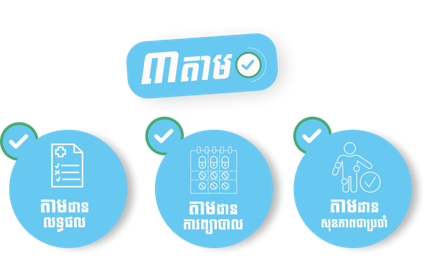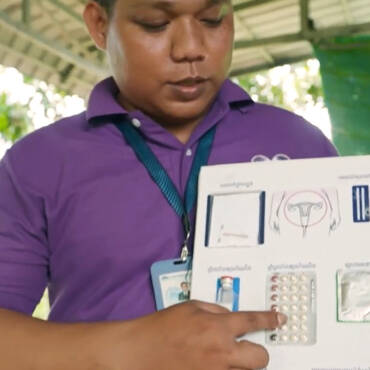3 Go, 3 Follow Campaign
Research has found that patients see healthcare professionals as an authority figure. Patients do not know how to advocate for themselves in the healthcare setting. They may not engage in collaborative communication with a healthcare professional because they feel intimidated and reluctant to ask questions. They may not share all their symptoms or not know the right questions to ask. This can lead to a lot of misunderstanding and misuse of healthcare. For example, patients self-medicate incorrectly because they don’t want to consult a healthcare professional and may end up with serious side-effects and untreated disease.
The USAID-funded Promoting Healthy Behaviors (PHB) Activity implements social and behavior change (SBC) interventions to encourage people to adopt a positive role in the interaction with healthcare providers.
PURPOSE
We want urban Cambodians to perceive that an “informed consumer” engages in health care consultation around their symptoms so that their perception of quality healthcare aligns with evidence-based medical care.
INTERVENTION
The 3 Go, 3 Follow campaign uses Facebook as the primary platform to reach out to middle class Cambodians aged 25-45, in the urban areas. Facebook reels, videos and static posts were used to share messages that create awareness around importance of questions by showing potential consequences of this behavior and impulse change.

3 GO’S
- Go see a healthcare professional: Persistent symptoms can indicate simple or serious illness. Don’t keep wondering which yours is – go see a health professional and get the answers and treatment you need.
- Go tell a healthcare professional: Experiencing weird symptoms? We all do sometimes! It’s important to share even the embarrassing symptoms with your healthcare provider, so they can give the right diagnosis and treatment.
- Go ahead and ask your questions: If you want to know what you are sick with and need to test or not, you should ask healthcare professional. You should not ask social media or keep yourself wondering. Therefore, you shall ask a healthcare professional that you need to go through any tests or what diagnoses.

3 FOLLOW’S
- Follow up the result: You should follow up to get results of tests or diagnoses which are done by a healthcare professional so that you can find out what disease you have, before you can get the right treatment.
- Follow up the treatment: Have you received a pack of medicine without understanding what each medication is for? Or you did not know how many times a day to take medicine? Or how many pills to take at a time? And how long the pills take to work completely? Ask a health professional if you have any questions regarding your treatment.
- Follow up your health: Get the right treatment and regular follow-ups to make sure the condition improves. Ask a healthcare professional how to monitor your disease progression and management.
MONITORING, EVALUATION AND LEARNING
PHB conducts ongoing monitoring of this and all its SBC activities, capturing data in terms of activities implemented, people reached, and materials distributed, as well as information on beneficiaries’ knowledge, attitudes, and behavior prior to and after exposure to PHB’s activities. Results and lessons learned are used to iterate and improve the SBC activities, and are regularly shared with the wider SBC community.
* The Promoting Healthy Behaviors (PHB) Activity is a USAID-funded Social and Behavior Change project that commenced in 2018. The goal of PHB is to improve health behaviors among Cambodians and ensure they seek and receive quality healthcare with decreased financial hardship. PHB initially targeted 6 key health areas: Maternal & Child Health; Nutrition; Water, Sanitation and Hygiene (WASH); Tuberculosis; Family Planning; and Malaria. In 2020-2021, PHB also implemented COVID-related activities in response to the global pandemic. Towards the end of 2021, noncommunicable diseases (NCDs) were added to PHB’s health portfolio, and the project was extended until June 2025.



